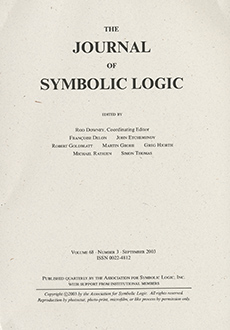Abstract
In this paper we study a reducibility that has been introduced by Klaus Weihrauch or, more precisely, a natural extension for multi-valued functions on represented spaces. We call the corresponding equivalence classes Weihrauch degrees and we show that the corresponding partial order induces a lower semi-lattice. It turns out that parallelization is a closure operator for this semi-lattice and that the parallelized Weihrauch degrees even form a lattice into which the Medvedev lattice and the Turing degrees can be embedded. The importance of Weihrauch degrees is based on the fact that multi-valued functions on represented spaces can be considered as realizers of mathematical theorems in a very natural way and studying the Weihrauch reductions between theorems in this sense means to ask which theorems can be transformed continuously or computably into each other. As crucial corner points of this classification scheme the limited principle of omniscience LPO, the lesser limited principle of omniscience LLPO and their parallelizations are studied. It is proved that parallelized LLPO is equivalent to Weak Kőnig's Lemma and hence to the Hahn—Banach Theorem in this new and very strong sense. We call a multi-valued function weakly computable if it is reducible to the Weihrauch degree of parallelized LLPO and we present a new proof, based on a computational version of Kleene's ternary logic, that the class of weakly computable operations is closed under composition. Moreover, weakly computable operations on computable metric spaces are characterized as operations that admit upper semi-computable compact-valued selectors and it is proved that any single-valued weakly computable operation is already computable in the ordinary sense.
Citation
Vasco Brattka. Guido Gherardi. "Weihrauch degrees, omniscience principles and weak computability." J. Symbolic Logic 76 (1) 143 - 176, March 2011. https://doi.org/10.2178/jsl/1294170993
Information





